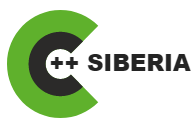The real difference between struct and class--Jonathan Boccara
Yes there is one.
The real difference between struct and class
by Jonathan Boccara
From the article:
“Should I use a struct or a class?”
Such is the question many C++ programmers ask themselves, or ask around to more experienced co-workers, when designing their code.

 Have you registered for CppCon 2017 in September?
Have you registered for CppCon 2017 in September?  This year C++ Siberia conference will take place in Tomsk at 25-26 of August. The opening keynote will be given by Ivan Cukic. The conference will be held at Tomsk State University.
This year C++ Siberia conference will take place in Tomsk at 25-26 of August. The opening keynote will be given by Ivan Cukic. The conference will be held at Tomsk State University.